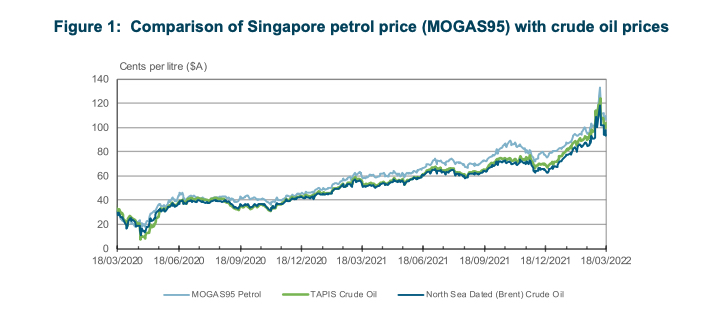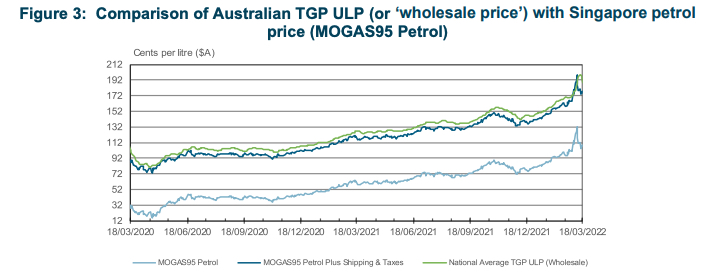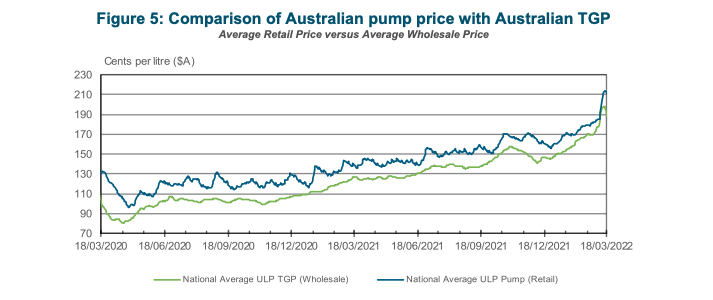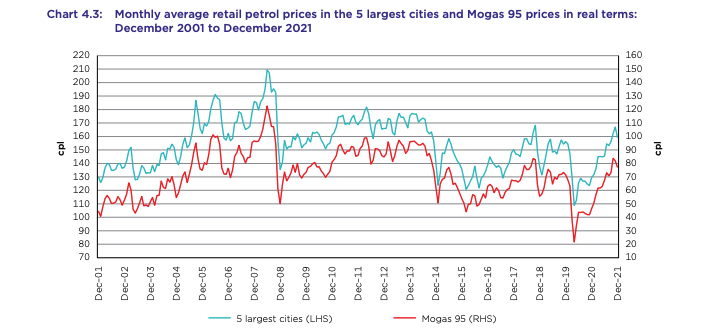
Facebook posts claiming the war in Ukraine “is not the reason” for higher petrol prices are false
What was claimed |
The verdict |
The war in Ukraine is not to blame for increased Australian fuel costs. |
False. The retail price of petrol in Australia largely reflects the international cost of crude oil, which rose sharply on Russia’s invasion of Ukraine. |
By Sonam Thomas
Posts shared across Facebook purporting to compare the cost of a barrel of oil between 2008 and 2022 claim that “the war in Ukraine is not the reason” for an increase in the price of petrol at the pump for Australian consumers.
“90 per cent of Australia’s oil comes from the Middle East,” a March 16 post reads. “Open your eyes, we don't rely on Russia for oil”.
The cost of petrol in Australia is contingent on a number of domestic and international market factors. Chief amongst them is the international crude oil price, which has risen due to economic disruptions associated with Russia’s invasion of Ukraine.
According to the Australian Competition & Consumer Commission, the cost of fuel – adjusted for inflation – hit an eight-year high in late February this year following Russia’s invasion of Ukraine on February 24.
ACCC data shows the seven-day rolling average retail petrol prices in Australia’s five largest cities averaged 182.4 cents per litre in the month of February, just below a 2014 peak of 182.7 cents per litre.
Although the latest ACCC data is yet to be released, prices continued to rise throughout March.
The cost of fuel to the consumer is ordinarily influenced by a number of factors, namely international oil benchmark prices, the Australian dollar’s exchange rate with the US dollar, levels of competition, and pricing decisions by wholesalers and retailers.
However, the ACCC attributed the February spike to three key factors: a boost in demand driven by post-COVID-19 economic recovery, a refusal to significantly increase oil production by the Organisation of the Petroleum Exporting Countries (OPEC) and Russia’s invasion of Ukraine.
While Russia is not a member of OPEC, it is a member of the OPEC+ group that released a statement on March 2 reiterating the group’s decision to maintain a previously agreed modest increase in production in April, despite calls from the international community for greater supply to avoid soaring prices.
Australia is not directly reliant on Russian crude oil, however, senior lecturer in Strategic Studies at Deakin University, Vlado Vivoda, told FactLab the conflict had pushed up the international benchmark cost of crude oil which had a flow-on effect on the Australian consumer.
“Petrol prices in Australia are largely based on the international price of crude oil and refined petroleum,” Dr Vivoda said in an email.
“The international crude oil market functions like one big pool and supply/demand shifts (and geopolitical risk) in one region affect the entire global market (and price).
“Russian oil and refined petroleum account for roughly 10 per cent of globally traded crude and refined petroleum. Analysts suggest that self-sanctioning by buyers and importers has already taken a significant chunk of Russian supplies off the market.”
The post claims crude was significantly more expensive at $US147/barrel in 2008 but only cost $A1.42 at the pump. In March 2022, crude was $US1.09/barrel but $A2.26 at the pump, alleging consumers are being “taken for a ride”.
Professor of economics at the University of Melbourne, David Byrne, rejected the notion that there had been a significant change in the relationship between the wholesale cost of crude oil and the price of petrol at the pump.
“[The] connection between oil and petrol prices hasn’t changed over time based on data I’ve seen so far,” he said.
Professor Byrne said a “key benchmark” for the cost of refined petrol in Australia was the market price of “Singapore Mogas 95”. Mogas 95 is high-quality automotive gasoline produced in Singapore, the largest oil refiner in the Asia-Pacific region, and represents about a third of Australia’s petroleum imports.
According to the ACCC, Mogas 95 accounts for “the largest component of the retail petrol price” and is influenced by the international cost of crude oil.
The close relationship between the cost of crude oil and Mogas 95 is demonstrated by data in the Australian Institute of Petroleum weekly report ending March 18, 2022, as shown here.
 Source: Australian Institute of Petroleum weekly report ending March 18, 2022
Source: Australian Institute of Petroleum weekly report ending March 18, 2022
The report also shows the cost of Mogas 95 closely determines the Australian Terminal Gate Price. The TGP – regulated by the ACCC – reflects the declared wholesale importation cost of petrol by importers.
 Source: Australian Institute of Petroleum weekly report ending March 18, 2022
Source: Australian Institute of Petroleum weekly report ending March 18, 2022
Finally, the data also illustrates the flow-on effect of the wholesale price to Australian consumers by comparing the TGP against average retail prices.
 Source: Australian Institute of Petroleum weekly report ending March 18, 2022
Source: Australian Institute of Petroleum weekly report ending March 18, 2022
For a longer-term view, the direct relationship between the Mogas 95 benchmark and the monthly average retail petrol prices in the five largest Australian cities over the past 20 years in real terms, can be seen in data produced by the ACCC.
 Source: Report on the Australian petroleum market, Dec quarter, 2021
Source: Report on the Australian petroleum market, Dec quarter, 2021
The verdictFalse. The most significant factor that contributes to the retail price of petrol in Australia is the international benchmark price of crude oil. Russia is a major exporter of crude oil. Its invasion of Ukraine and the resulting economic sanctions have inflated the international benchmark price with flow-on effects in Australia’s domestic market.
|


Acknowledgement of Country
RMIT University acknowledges the people of the Woi wurrung and Boon wurrung language groups of the eastern Kulin Nation on whose unceded lands we conduct the business of the University. RMIT University respectfully acknowledges their Ancestors and Elders, past and present. RMIT also acknowledges the Traditional Custodians and their Ancestors of the lands and waters across Australia where we conduct our business - Artwork 'Sentient' by Hollie Johnson, Gunaikurnai and Monero Ngarigo.
More information